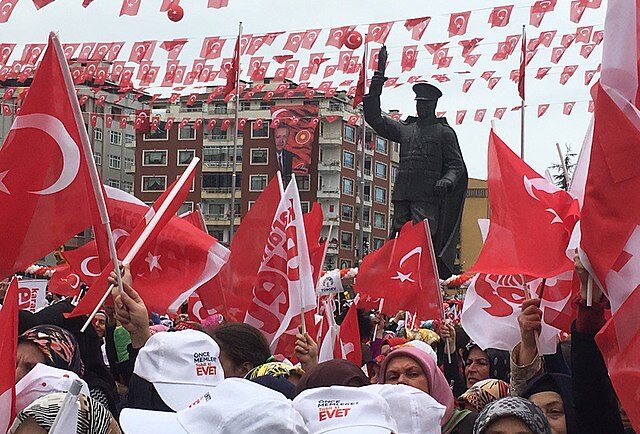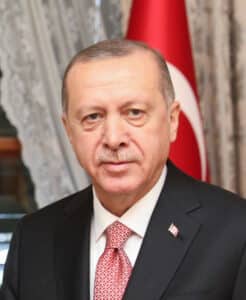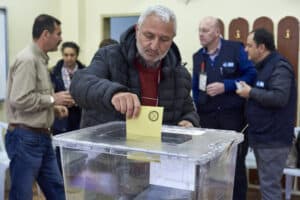Photo: Statue of Atatürk oversees Erdogan rally – Wikimedia Commons
Last week was Türkiye’s 100th birthday. On October 29, 1923, national hero Mustafa Kemal Atatürk founded the Republic of Türkiye; a secular state built on the ruins of the Ottoman Empire. The festivities, however, were scaled down, making many to think that to prioritise his own political agenda, president Erdogan actively downplays Atatürk’s secular legacy and with that the foundations of his country.
A new modern state
The Ottoman Empire was on the losing side of WWI and crumbled down. Atatürk was known for his military achievements during the Turkish War of Independence afterwards, keeping out the victorious European powers. Atatürk blamed the Empire’s fall partly on its religious foundation. Secularisation – the separation of religion and state – was the core of Atatürk’s ideology and one of the main parts of Türkiye’s West-facing modernisation. The republic put an end to the caliphate, women were allowed to vote, headscarves were banned in schools and public institutions, alcohol was no longer prohibited and the Arabic script was replaced with the Roman alphabet. “Ataturk was a top-down politician who believed in social engineering and he wanted to refashion Turkey as a secular, West-facing, European society,” said Soner Cagaptay, an expert on Türkiye at the Washington Institute. Religion was separated from public life for the sake of modernisation and development, putting an end to the Islamic standards of the nation. Not all Turkish people have been fond of the secular state and a division was created within Türkiye’s society between secularists and conservatives. Islamists are no big fan of Atatürk, blaming him for neglecting the Ottoman heritage of the Turkish people. The results of the latest elections are a reminder of the deep polarisation within Turkish society between Islamists and secularists.
A country of coups
As Türkiye is officially a secular state, Pro-Islamic parties are historically not allowed to compete in politics. Whenever a party is perceived to propagate religious values or is affiliated with religion in any way, the Turkish military would intervene by removing and deposing the party from the political scene. Therefore, parties claim to be secular, until they are in the governing position and start to implement policies inspired by Islam. The Constitutional Court has banned several political parties that became too much Islamic-oriented, on the grounds that they undermine the country’s secular basis. The military is the patron of the constitution and intervenes to restore the constitutional order when it is put under pressure. This has happened regularly in Turkish history. Military coups have taken place in 1960, 1971, 1980, 1997 and most recently there was a failed attempt in 2016.
Erdogan and the AKP
Erdogan’s religiously conservative AK (Justice and Development) Party came to power in 2002. Its predecessor was banned by the constitutional court because of its “anti-secular activities”. Both Erdogan and the party have experienced a growing Muslim identity. They claim that Muslim people are marginalised by the secular laws of the country. In recent years Erdogan has profiled himself as an Islamist – someone who believes the state should be ruled along the lines of Islam. Erdogan is committed to a significant role for Islam in education and public policy. By emphasising the country’s Islamic heritage at the expense of its secular history, Erdogan addresses a large part of the electorate that has been voting for him for over 20 years now. You would think the AKP would be pushed from the thrown by the military as well for being too religious. However, the 2016 coup failed, due to growing anti-secular sentiment in Turkish society.
Crossroads
Turkish diplomacy has been Western-oriented during the 20th century. Türkiye joined NATO in 1952 and acquired candidate status to the EU in 1999. Since Erdogan and his party rule the country, Turkish foreign policy is no longer oriented towards the West only and it is seeking closer ties with countries in the Middle East. The Arabic principles that were the base of the Ottoman Empire, have not completely disappeared in Turkish population, and have been revalued under Erdogan. It has realised its unique geographic location in the world could provide them regional power. Türkiye is exploiting its geostrategic position by making friends in all directions and profiling itself as a middleman who can mediate in regional conflicts. Türkiye’s foreign policy is set to give the country a prominent role in the Middle East, again. It supports Arab countries rather than Israel, operates militarily in Iraq and Syria, and has been building its own defence industry, increasing its autonomy. In addition, since 2016 EU accession talks have been stalled due to the worsening human rights situation and democratic backsliding in the country, making an EU future almost impossible. Atatürk’s Western-focussed, non-Islam ideology has been under pressure and partly reversed with these developments in the last two decades.
“Türkiye’s Century”
Erdogan shows similarities with Atatürk as a top-down politician who believes in social engineering. His values however, are the exact opposite of what Atatürk complied to. Some of Atatürk’s anti-Islamic policies have been reversed by Erdogan, such as restricting sale of alcohol, restoring the women’s headscarf and transforming the Hagia Sofia into a functioning mosque again. Erdogan claims the coming century will be “Türkiye’s century”; setting out a roadmap to boost the country’s position on the world stage. It seems Erdogan would like to take Atatürk’s throne as the country’s most honoured leader and wants to go down in history as Türkiye’s most revered statesman of its second century – a century that will make of Türkiye an important regional power again.
Since Türkiye has shifted from a parliamentary system to a presidential one – as a result of a referendum held in 2017–, the system of checks and balances has been deteriorating and the country is under authoritarian rule by Erdogan. The president and about half the country share Islamist values and believe the secular foundations of the country are not in line with its history and values. What is worrying is that Erdogan uses this anti-secular agenda to further strengthen his authoritarian rule over the country. Although Erdogan is without a doubt an authoritarian leader who undermines the democratic principles of his country, the regional power the country has and the potential role as mediator in many conflicts, still make the country an important ally to the EU, despite the fact that its values are no longer aligned to the EU and accession seems to be something of the past. This does not alter the fact that the EU must speak out against the worrying democratic state and the rule of law situation, but it must realise that a tense relationship with Türkiye complicates the EU’s position in the world only further.
Written by Timon Driessen



